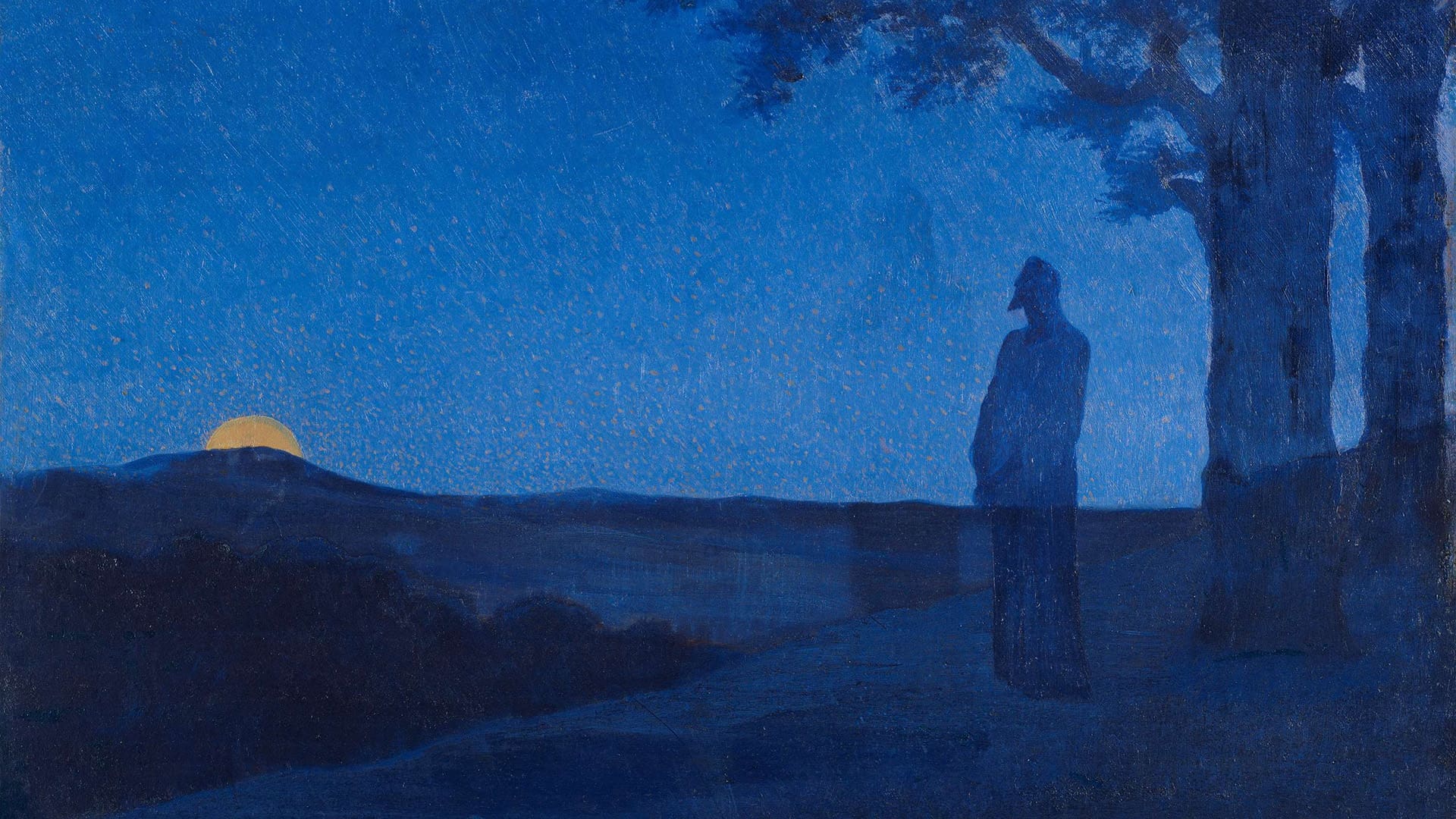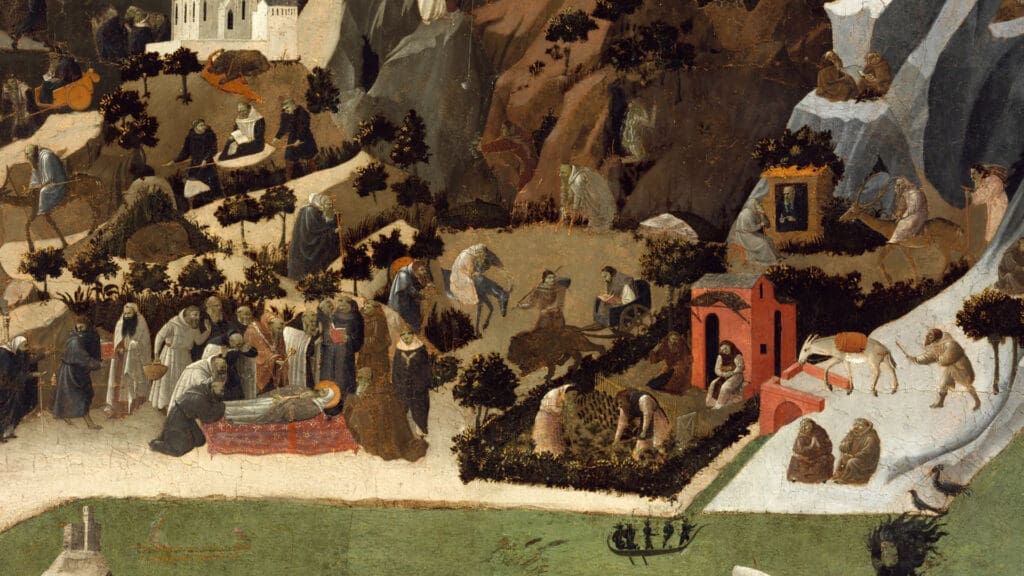I
In 1901, an American doctor named John Harvey Girdner coined the term “Newyorkitis” to describe an illness whose symptoms included edginess, quick movements, and impulsiveness. At the time, he said it was “a disease which affects a large percentage of the inhabitants of Manhattan Island.” As a native New Yorker, I can’t help but laugh and gasp at these words. I laugh because Girdner lived in a world long gone—a world without the internet, high-speed cars, and other technological advances that inform everything we do. I gasp, however, because if Newyorkitis is what Girdner observed over one hundred years ago, where does that leave us today?
Girdner saw something in 1901 that captured the dangerous pace we often unwittingly live. Our world hasn’t slowed down. It continues on faster and busier, and we are reminded that our souls were not created for the kind of speed to which we have grown accustomed. Consequently, we are a people out of rhythm, a people with too much to do and not enough time to do it. This illness is no longer a New York phenomenon—it has infected people around the world.
This pace of life has taken over every aspect of our lives, public and private, infringing even on our spirituality. What we need is not more efficiency or sustainable ministry practices that will accommodate our busy lives. What we need is a spirituality of privacy.
It’s important to clarify a few things from the start. While a spirituality of privacy can—and practiced rightly does—lead to creative and compelling engagement with public life, practiced wrongly it is self-orienting and disregards our shared responsibility to renew society in faith, hope, and love. On a more personal and existential level, there’s a way of privatizing spirituality to a degree that we unconsciously hide ourselves from God. It’s the primordial human instinct after the fall in Genesis 3. In the words of Thomas Merton, “Every one of us is shadowed by an illusory person: a false self. This is the person that I want myself to be but who cannot exist, because God—because Truth, Light—knows nothing about him. And to be unknown to God is altogether too much privacy.”
But there is something redemptive and socially integrative about privacy when aimed in a contemplative direction. It’s a direction found in the way of life of early Christian contemplatives, in the testimony of Holy Scripture, and most compellingly in the life of Jesus himself.
But before we go there, allow me to sketch some of my own journey within this tradition.
Three Monasteries
The call to privacy—that is, to a rhythm of contemplative life that seeks to live with greater attentiveness to God’s presence—has shaped my spiritual journey since my early twenties. Soon after making a decision to follow Jesus, I carried many questions about the next steps to take in my newfound faith. Thankfully, I had to carry them only a few steps down the block to my grandfather’s Brooklyn home. This man, Marcos Rios, was at once a Pentecostal and a contemplative, a follower of Jesus with a deep longing for a concrete expression of God’s presence. At seventy-seven years of age he had journeyed with Christ for decades, prioritizing a regular practice of solitude and reflection.
A few days after coming to faith in Christ, I entered his small bedroom. He was flanked by antique furniture and a window fan to cool him on that hot summer evening. He had the Bible on his lap and a jar of M&Ms on his nightstand. At every turn of the page, he’d pop one in his mouth.
I sheepishly entered his presence, seeking to ask a question about the Bible. He invited me to sit next to him, offered me some M&Ms, and off we went. Over the next eight months, four to five days a week, two to three hours each session, we talked about faith. While he gave me many lessons over that period, what I remember most is not his fine theological reflection but his contemplative way of being, a thoughtful, deliberate way of life centred on private prayer.
My grandfather’s bedroom was my first monastery.
I would learn about a spirituality of privacy a couple of years later as a college student. At the end of one semester, I visited a Franciscan monastery with thirty classmates.
During the weekend, the students were placed in different parts of the grounds for about eight hours to just “be with God.” I was told to remain on the platform of an outdoor chapel, with no Bible, only a journal. My assignment was to spend the day in solitude and write about the experience. It was one of the most challenging and exhilarating days of my life.
I closed my eyes and listened to the sounds of birds chirping. I watched a colony of ants working diligently. In the stillness of those moments, every part of creation somehow connected me to God.
I looked out into the empty rows of wooden chairs, wondering about my future life of preaching. I fixed my gaze on the statue of baby Jesus being tenderly held by Joseph at the centre of the platform. As I closed my eyes and breathed deeply, I imagined God holding me in that tender embrace. There were moments of delightful contemplation when I heard words of God’s grace spoken deep within my heart. I journaled many pages of prayers, fears, and requests; and when I got tired of writing, I just stared out into the monastery grounds.
For Jesus, privacy was a means of discerning the kind of leader and Messiah he would be.
It wasn’t all heavenly. I got bored. There were moments of dread. Often I became uninterested in my assignment and wanted to be somewhere else. I mean, after just an hour of solitude and silence, I was ready to go home. But I was stuck there. To break up the monotony I jogged in place, did push-ups, and (not sure I should confess this) took power naps on the sturdy eucharistic altar.
Yet something happened in me that day.
From that moment, the appetite of my soul was awakened. Upon returning to my college campus, I found myself sneaking off to the library or to quiet spaces to pray (as if I were doing something illicit). Something was planted in me, and I knew I needed to follow this path more intentionally.
That was monastery number two.
My third and most significant monastic experience occurred when I was twenty-nine. It has since shaped my annual rhythms of privacy.
In Spencer, Massachusetts, there’s a Benedictine monastery that has carried the vocation of fixed hours of prayer, rigorous theological study, and the brewing of beer. On my first visit, I kept the hours with the monks, praying at three in the morning and retiring for the night at eight o’clock. In between there were multiple opportunities to behold the beauty of God in silence and solitude. This experience left an indelible mark on me and has led me to return to this sacred space annually.
What was most formative for me in all three of my monastic experiences was their integrative nature. Whether it was my Pentecostal grandfather, Franciscan brothers, or Benedictine monks, each gave me a vision that a contemplative life—what I’m calling a spirituality of privacy—has something to say to the world. Silence shapes social imagination. Prayer forms a consciousness of justice. Reflection grounds one in a state of awareness to the areas of human fragmentation that need healing.
All of this is embodied in the person and ministry of Jesus.
Privacy in the Life of Jesus
The Gospels offer a rich testimony to Jesus’s oscillation between the public and private expressions of his life. This rhythm of public engagement and private exploration was not simply a means of sustainable ministry in a pain- and sin-stricken environment. It was a means of properly seeing his calling and engaging public life from the deeper centre. The start of his public ministry bears witness to this.
After Jesus’s baptism, a voice from heaven showers him with words of belovedness: “You are my Son, whom I love; with you I am well pleased” (Luke 3:22).
Soon after this encounter, Jesus goes into the wilderness and is tempted by the evil one. His baptism and wilderness pilgrimage echo Israel’s passage through the waters of salvation in the exodus story and their subsequent wilderness journey. Jesus is re-enacting the sacred history of the people of God. In the wilderness, we see the pattern of privacy and public life. For Jesus, privacy was a means of discerning the kind of leader and Messiah he would be.
In the wilderness temptations (Luke 4), the devil offers Jesus three ways of being a Messiah that would be oriented around self-service. Turn stone into bread. Jump from the temple and angels will catch you. Bow to me and all the kingdoms of earth will be yours.
Jesus is tempted into a life dominated by appetite, sensational ministry, and power. After forty days in the wilderness, he is able to resist each temptation, and he emerges with a clear vision of the kind of public ministry he will order his life around: one marked by self-giving love, humility, and confrontations with worldly notions of power.
Directly after this wilderness moment, he enters the synagogue with a particular vision of public life and ministry.
The Spirit of the Lord is on me,
because he has anointed me
to proclaim good news to the poor.
He has sent me to proclaim freedom for the prisoners
and recovery of sight for the blind,
to set the oppressed free,
to proclaim the year of the Lord’s favor. (Luke 4:18–19)
Note the correlation. For Jesus, privacy with God was a means of inner clarity regarding his mission. This back-and-forth of private encounters with his Father and public engagement with the community would be the pattern of his life.
In the words of Henri Nouwen, he had a ministry of absence as well as a ministry of presence.
The ministry of absence—or privacy—was necessary to re-centre his identity and mission on the existential reality of his communion with God. And this absence paved the way for a deeper presence when he was among the masses.
We can see what privacy did in Jesus. What is it to do in us?
Privacy Grounds Us in Reality
One of the great hindrances of love is found, as Merton observed, in our false self. If our true self is hidden with Christ in God (Colossians 3:3), our false self is a constructed identity that in some way tries to play God. One of the ways this happens is by locating the problems of the world “out there.”
It is possible to pray in such a way that we are never confronted with our false self, which is why contemplative prayer is so necessary. In contemplative prayer we entrust ourselves to God, giving the Holy Spirit space to reveal the inconsistencies within, the intense imaginary conversations stored in our minds, and sins we need forgiveness from—all important for loving well. It’s hard to love others well when the problems are always outside us.
But until we give ourselves to the hard, slow work of confronting our own demons, we will project our demons back into the world and fail to see that some demons in the world are reflections of ourselves. One of the reasons contemplative prayer is socially subversive is that it reveals our personal contradictions. And when we are able to reject illusions of ourselves, we can live with greater discernment as we engage the world.
When we are able to reject illusions of ourselves, we can live with greater discernment as we engage the world.
Privacy Is a Space for Discernment of Speech
I remember the summer of 2001. I had been a Christian for two years. On one morning as I read through the book of Proverbs, I came across this verse: “In the multitude of words sin is not lacking, / But he who restrains his lips is wise” (Proverbs 10:19). I was struck by these words and committed to restraining my lips. It didn’t last long. As a new, zealous Christian, I was too fixated on correcting others (like the time I called a Christian TV program and berated a customer-service representative for the show’s heresy), arguing with people who held different faiths (like the time I invited a group of Jehovah’s Witnesses into my Brooklyn apartment just to put them in their place), and proudly demonstrating the newfound knowledge I’d gained an hour prior. I loved to talk (and still do, God help me). Over the course of my journey in following Christ, I have learned that limiting my words is more than a matter of willpower. I need God to work in me. The sayings of the Desert Fathers have proved to be a guide for me in this area. Here are two of my favourites:
They said of Agatho that for three years he kept a stone in his mouth in order to teach himself silence.
Abba Isidore of Pelusia said, “To live without speaking is better than to speak without living. For the former who lives rightly does good even by his silence but the latter does no good even when he speaks.”
This way of life might seem impossible. But these sayings help us see that way of life, and with God’s help we can live from that place.
Of course, we don’t contemplate so that we can achieve results. At the core of contemplation is enjoyment and communion with God, full stop. Living in God’s presence is our aim. The greatest fruit of contemplation is a growing capacity to order everyday life from the centre of God’s abiding life with us. The surprise of Christian contemplative practice is that transformation can happen just by showing up and aligning one’s heart with God. Even so, there are some notable changes in our lives that contemplative practices make available to us.
In his book How God Changes Your Brain, American neuroscientist Andrew Newberg recounts performing brain scans on Franciscan nuns, Buddhist practitioners, and Pentecostal believers to see how their brains reacted to prayer. He writes,
In short, practicing contemplation can permanently and positively change your life—and our world. One of the chief benefits of contemplative prayer is the lowering of anxiety and anxious reactivity. I wonder whether this is why we never see Jesus exhibiting anxious reactivity in the Scriptures.
Jesus spent much time in solitude and silence, and he never succumbed to the unrelenting pressures around him. Contemplative prayer forms us to love well because love requires calm presence over reactivity. In contemplation, our brains are rewired, giving our bodies the expanded capacity to be present with ourselves and others. Contemplative prayer forms love in us because it aids us in addressing our dark sides, renews our minds, and trains us to discern our words.
Privacy Shapes Our Prayer Life and Our Public Life
It was soon after my conversion to Christ that I was introduced to the Desert Fathers. The desert tradition—first prominent in North Africa in the fourth century AD—arose from a countercultural monastic community in Egypt marked by practices of silence, solitude, fasting, introspection, and meditation.
These communities longed to follow Jesus in a way that cost them something. They were not content living in such a way that mirrored the decadence of the decaying empire around them. They wanted to live in God for the sake of healing the world.
This is why they fled to the silence of the desert—not because they preferred introversion but because they knew something powerful was available only in the contemplation that could come from spiritual privacy.
The same is true today. In words attributed to Karl Barth, “To clasp the hands in prayer is the beginning of an uprising against the disorder of the world.” The call to privacy is not a means of privatizing faith but a path to true presence in the world.






